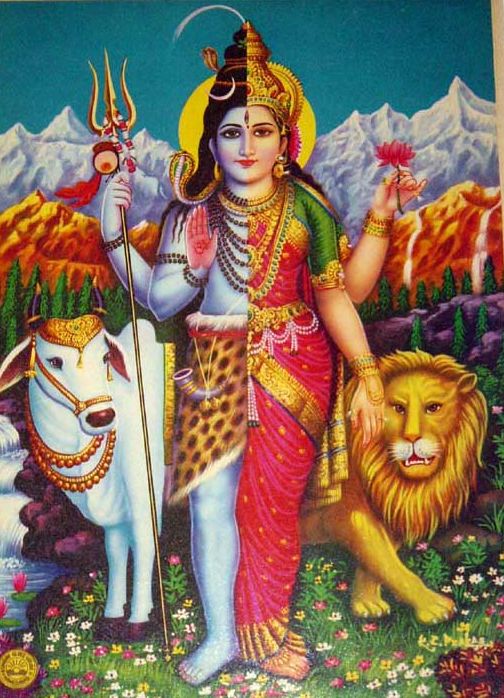Of course I´ve been researching whether there actually is a god or a goddess or at least some saint of balance. However balance, even the equilibrium of forces does not seem an honorable domain. Not for gods and not for for saints.
Even Justitia, who with her scale is at least visually seeking balance, is primarily responsible for justice. But this is at most an aspect of the divine principle of balance.
Perhaps the Greek goddess Harmonia (Roman: Concordia) would have stood a chance as a goddess of balance. She is the daughter of Aphrodite/Venus (Love) and Ares/Mars (War) afterall. However she is not even responsible for what we call harmony. But rather for consensus and concord in the sense of unity and not really the balanced union of opposites.
There also was no suitable saint to be found. Though there are even some Christian saints for difficult weddings (St. Phillip Howard of Arundel). For urgent matters (St. Expedit) and two (!) for the internet (St. Isidor of Seville and St. Jakob Alberione.) But none even for ecological balance. The patronage of St. Francis and the Native Indian Saint Kateri Tekakwitha comes closest. But it only concerns the protection of nature. There is also none for temperance or keeping measure – which would at least lead somewhat into that direction.
Uniting opposites is apparently not an expression of balance
In ancient Greek-Roman mythology there is Hermaphroditos, a child of Aphrodite and Hermes. He is described as a “male youth with long hair and female breasts.” More about him is found in the writings of the Roman poet Ovid. He equips Hermaphroditos with a myth according to which the innocent youth is seized by a love-stricken nymph while bathing in a pond. The nymph asked the gods Hermes and Aphrodite to be connected to him inseparably. The gods granted her wish and both merged into one and where henceforth a hybrid.
When Hermaphroditos realizes what happened to him, he asks his divine parents that everybody who bathes in the same pond as he would share his fate.
His fate made him the suitable name giver of the phenomenon when creatures happen to have male and female sex characteristics. In science this is characterized as “hermaphrodism”. Among humans this was considered a disease until the recent past. But now being called “intersexuality” it is met with more acceptance in society and makes people with these features not necessarily outsiders anymore.
This initially negative view of the ambiguity of the sexual appearance was fostered by Ovid. For the poet also could have chosen to stress the divine quality of this powerful union. Then it would not have been a magically presumptuous nymph, but the power of love for each other that might have made them one. Alas, Hermaphroditos is no representative for the fortunate balance but the unfortunately forced union. Or as Ovid wrote: “He was man and woman as well and yet neither one or the other.” That sounds like two dead ends and thus does not make him a suitable candidate as a god of balance.
None of the Greek, Roman or Germanic divinities is a likely candidate
The only Germanic gods that ever cross the gender line are Thor and Loki and that only in order to win back Thor´s hammer. A certain giant called Thrym had stolen it in order to demand the love goddess Freya as ransom to become his bride. But Freya of course doesn´t want to. So a ruse from Loki requires that Thor masks himself as bride and Loki himself dresses up as a bridesmaid. Together they go to the court of the king of giants, who is thrilled at the sight of the apparent bride. When in the course of the wedding ceremony the hammer is placed into lap of the bride, Thor grabs it at once. He smashes the grooms head as well as that of the other giants for now he has the power over his hammer back.
But this event does not qualify Thor and Loki as potential gods of balance. If anything perhaps as patrons of dragqueens. Besides, Thor is the god of thunder (that´s why he needs the hammer…) and is actually a well feared battle and war god. And Loki, with his tendency to create discord is more a god of chaos and therefore one that actually creates imbalances. Despite the fact that they are needed too. As paradox as it may sound: an imbalance is needed for the balance of balance, but that alone is not sufficient.
A Hindu god is quite close!
The East Indian divinity Ardhanarishvara comes closest to my idea of a god of balance. A hindu myth tells how there once was a time in the history of creation when beings didn´t procreate. So Shiva himself split himself and turned the right half of his body into a man and the left half into a woman. Then he split into Shiva and Parvati – who embodies the fertility aspect – and created new beings.
This androgynous Shiva – who is man and woman at the same time – is symbol of the primal union of all, that then splits into its polar opposites. As this expression Shiva has the name Ardhanarishvara and interestingly enough there are some visual renditions of the divinity where the female side is right and the male left. (And for those who speculate what a vertical split might physically look like: it´s a futile venture for Hindu gods are usually depicted with clothes on, so he is wearing a dhoti on the one side and a sari on the other…)
With his embodiment of the union of man and woman Ardhanrishvara actually goes beyond balance: his gestalt is the expression of fusion – the absolute oneness from which all comes forth. No balance has to be created then – it is and has always been there – if one takes ALL into consideration. But to make creation possible, the split in polar opposites is required…and thus ensues the eternal game of divine balance. From this point of view Ardhanarishvara is less a guardian than a creator of balance – which would not be imaginable without opposite poles.
In a certain sense the god of balance is balance itself
Perhaps no single divinity is actually suited to represent the entirety of divine order – the wholeness of the metaphysical balance and dynamic. Perhaps, because this divine balance, this cosmic harmony is an expression of the divine itself – however you want to call it – and that makes all gods and goddesses a part of it.
Michael Roads, the modern mysticist and spiritual teacher from Australia, likes saying that one of his favorite names for god is “the endless song of infinite balance.” (Apparently this beautiful phrase comes from the poets Lucille O’Dell and Robin Arnold who published a little book with poems and stories with the haiku-esk title: “The Endless Song of Infinite Balance: Realizing the Non-Power that is all Power.”) That expresses this notion rather clearly.
This makes everyone and all of us together an expression of this Divine Balance. I think it also makes us all gods of this infinite balance, for each one of us is constantly committed to finding his or her most adequate place in the cosmic order and within the sensitive and eternally dynamic balance of forces.



